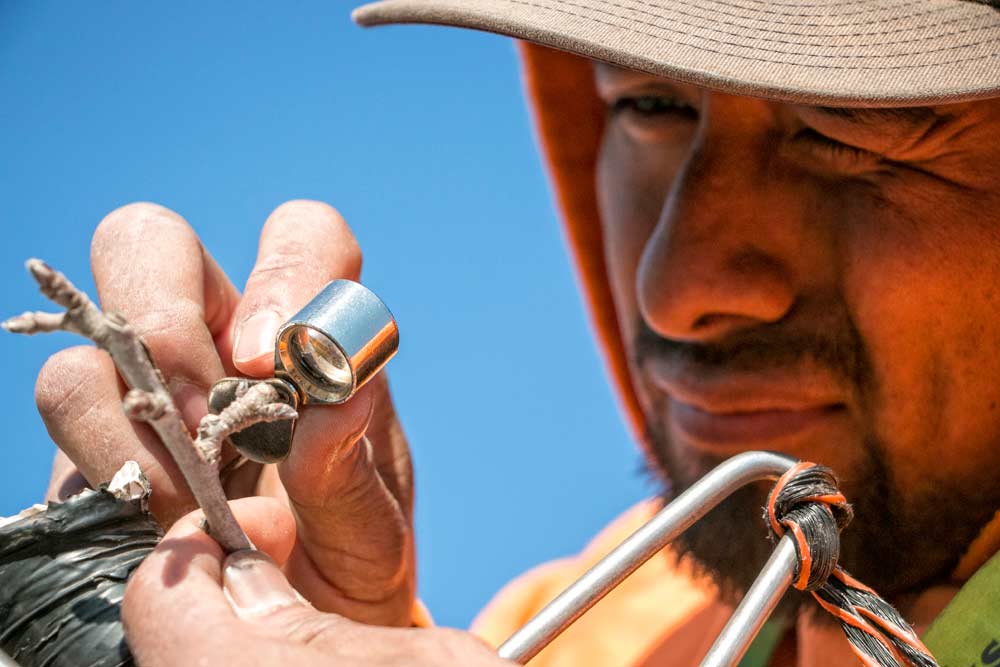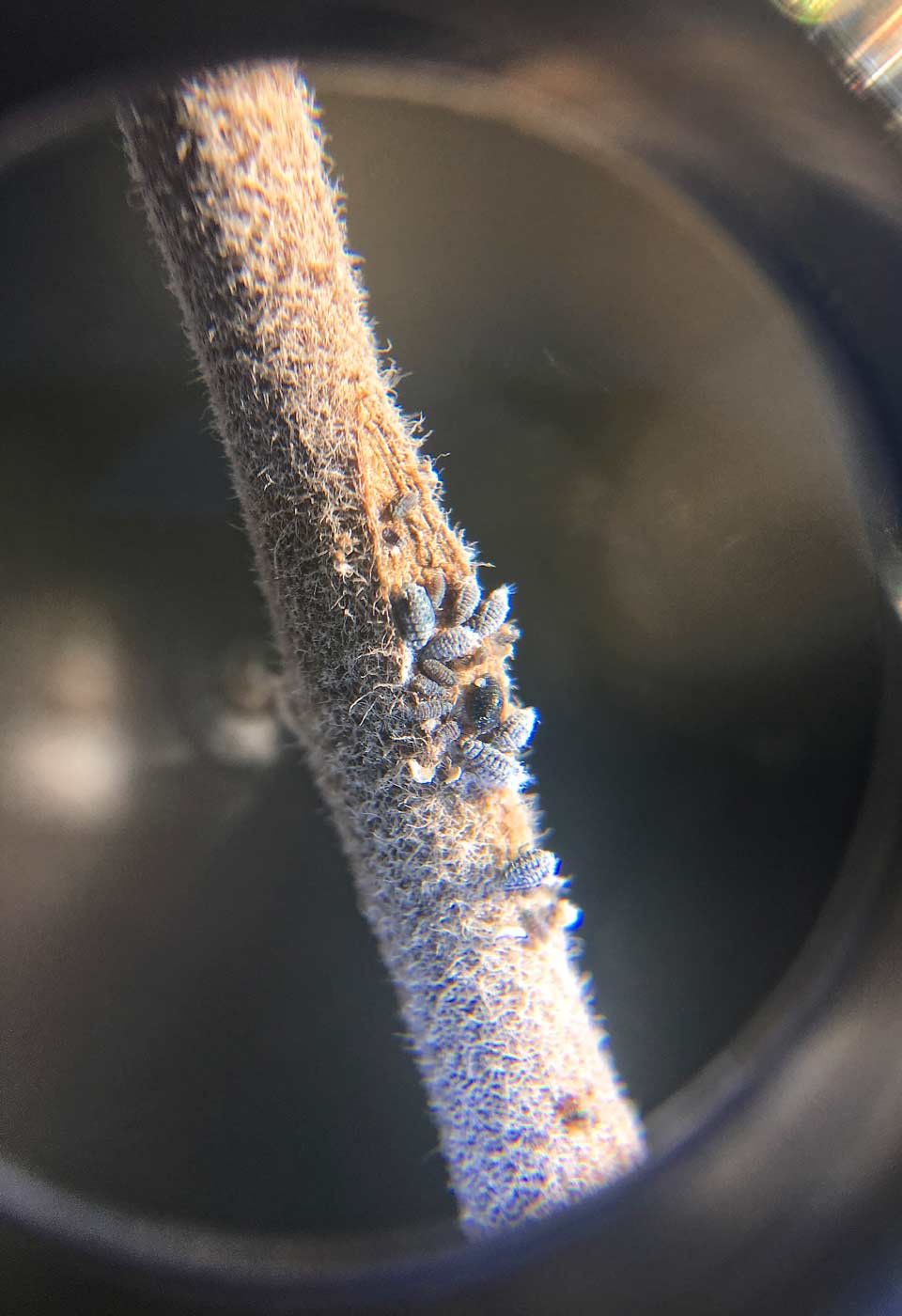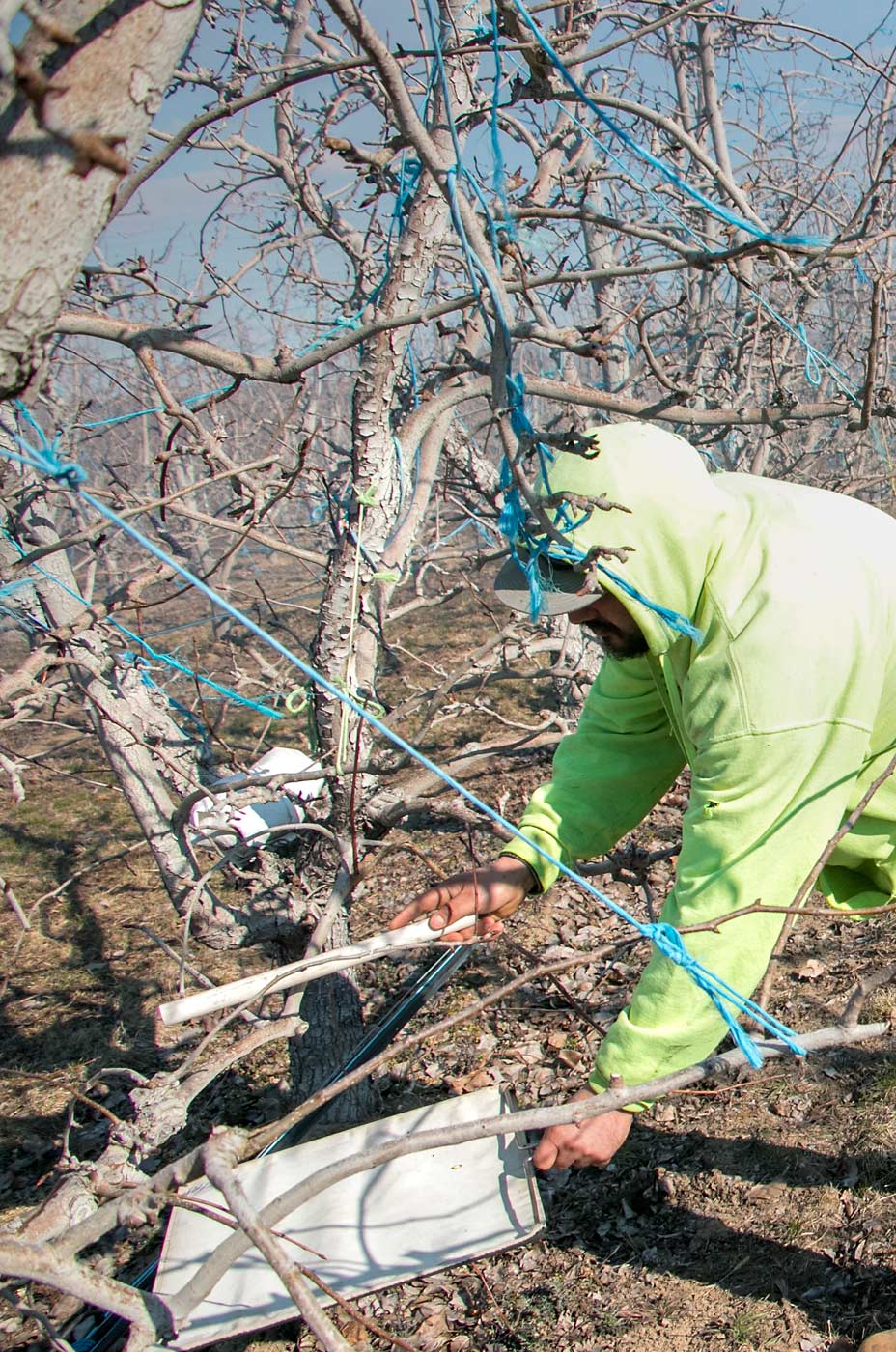
Robert Rodriguez inspects a Granny Smith shoot for red mites, a tiny early season pest that shows up near orchard perimeters, stirred with dust, in early March at Manzana Orchards in Royal City, Washington. Rodriguez is part of a scout team that combs orchards for early signs of pests to help growers target their control methods more precisely. (Ross Courtney/Good Fruit Grower)
On one of the first warm days of the year in early March, Robert Rodriguez searched for red mites under an archway of still bare Granny Smith branches, stopping every so often to whack bugs onto his white beat tray and inspect a few shoots through a loupe.
At the end of his row, he joined other workers carrying the same tools to load a bus labeled “Scout Team.”
“There are times we’re going to have to check from now until August,” Rodriguez said.
Forming, training and deploying scout teams are a critical part of IPM strategies for both organic and conventional growers, said Dain Craver, an orchard consultant in Royal City, Washington.
“I’ve tried to get other growers to start their own scout teams,” Craver said.
Craver, who owns DAC Consulting and owns some of his own orchards, hires his scouts from farms in and around Royal City for extra hours of work in the late afternoons or Saturday and Sunday. Several of the industry’s big orchards deploy their own scout teams already, but Craver suspects the practice will become more common with the rising demand for organic fruit and the increased controversy and cost associated with spraying in conventional orchards.
“I think you’ll see more and more people doing it,” he said.

A cluster of woolly aphids are shown through a loupe, a small magnifying glass used by scout teams, on a Honeycrisp shoot at Manzana Orchards. (Ross Courtney/Good Fruit Grower)
Worth the money
His fellow speakers at the Washington State Tree Fruit Association annual meeting in December echoed that sentiment.
Teah Smith of Zirkle Fruit Company considers scouting a critical IPM tool.
“It’s key to determining who’s present, who isn’t present and then determining whether or not what you’re seeing in the field is matching up with the phenology and models that you’re looking at,” she told growers at the Washington State Tree Fruit Association’s annual meeting in December in Kennewick, Washington.
She recommends diligent and detailed scouting before and after spraying and the release of natural predator insects. “Scouting is key to determining how well your IPM program is working,” she said.
Craver estimates a grower would need to budget about $10 per acre to start a scout team.
Jose Ramirez, one of Craver’s longtime customers, considers that money well spent. “It’s a competitive world. You spend a lot of money, but you also want to spend it right,” said Ramirez, who manages Stein-Manzana Orchards and owns El Paraiso Orchards, both in Royal City. He also is the past chair of the Washington State Tree Fruit Association.
Ramirez once worked for Craver as a scout and knows his bugs, but he still hires Craver’s crew to spot problems he may miss. “You don’t want to assume that because you don’t see anything yourself that everything is OK,” he said.

Craver’s scouts use beat trays and snap off shoot samples to search for pear psylla in a pear block. (Ross Courtney/Good Fruit Grower)
Industry cred
Craver’s scouting program dates back to the 1990s when he trained his scouts himself. In the early 2000s, he helped Wenatchee Valley College’s Hispanic Orchard Employee Program start an IPM class to teach scouting, where Ramirez got his start. Today, nearly all of Craver’s scouts attend the class.
While riding between orchards on the bus bearing Craver’s logo, the scouts said they like the extra work, the chance to get another view of rearing trees and boost their skill set.
Craver deploys them once a week — more often during bloom because of the variety of pest problems then — and gathers them the next day to compare notes they keep on handwritten charts. They also bring with them plastic bags of samples bearing evidence of pests or disease.
“They’re competitors; they just won’t tell you,” Craver said. “They like to bring that bag in and show me that bag.”
As the scouts emerged from the bus again, they fanned out in a block of Honeycrisps, again beating branches and inspecting snapped off shoots. As they exited from the other side, they compared results. Geronimo Gordillo found a cluster of woolly aphids, while another scout found a green aphid, an unusual find for early March.
“What’s a green aphid doing out here,” bellowed Craver, who moonlights announcing basketball games at Royal High School.
Craver believes his scout team carries some industry cred.
“They’re kind of cool,” Craver said. “They’re known as the scout team. It kind of brings a little status.” •
—by Ross Courtney






Leave A Comment